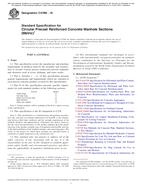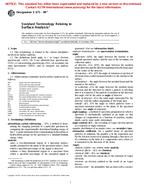1.1 This specification establishes a limit for thermal residual stress in reusable annealed glass laboratory apparatus as determined by prescribed photoelastic measurement procedures.
1.2 In broad classification, the laboratory glassware items covered by this specification, but not limited to, are:
beakers Imhoff cones bottles, aspirator impingers bottles, dropping jars, battery bottles, gas washing jars, bell bottles, infusion jars, chromatography bottles, milk test jars, cylindrical bottles, reagent joints, ball and socket or standard taper bottles, weighing manometers bulbs, absorption percolators bulbs, leveling pycnometers bulbs, sampling stopcocks burets tubes, centrifuge condensers tubes, chromatography crystallizing dishes tubes, color comparison (turbidity) culture dishes tubes, combustion (ignition) custom apparatus tubes, connecting and adapter cylinders, graduated and plain tubes, digestion desiccators tubes, drying extraction tubes tubes, fermentation flasks tubes, thistle (spray traps) fritted ware vapor traps funnels viscometers generators, Kipp watch glasses grinder, tissue
1.3 This specification recognizes that photoelastic measurements are proportional to the difference of the principal stresses. The limit imposed represents a safety factor to cover a situation in which one of the principal stresses may be larger than the apparent stress.
1.4 This specification applies only to annealed glassware that is intended for sale as such. It excludes glassware that has been thermally tempered, ion-exchanged, or laminated with glass layers of differing expansion. The intent of this specification is to limit the residual stresses for safe consumer use in annealed glass, as it leaves the manufacturer.
1.5 Stresses introduced by thermal expansion differences within the glassware are covered by this specification. Graded and glass-to-metal seals are excluded.
Product Details
- Published:
- 04/10/1998
- Number of Pages:
- 3
- File Size:
- 1 file , 29 KB


